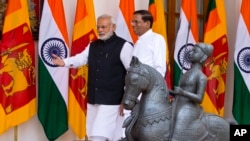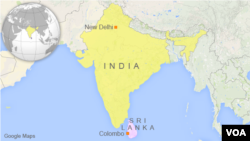Indian Prime Minister Narendra Modi and Sri Lanka's newly elected president Maithripala Sirisena held wide-ranging talks in New Delhi on Monday, which culminated in the joint signing of an agreement on nuclear safety that calls for India to help its south Asian neighbor build its nuclear energy infrastructure.
Targeting strengthened strategic relations, increased trade, and resolution of long-standing disputes, the talks were hailed by Modi as an "unprecedented opportunity" to take ties to a new level. He called the nuclear safety agreement a testimony of mutual trust between neighbors.
“We have a broad range of interests — economic developments for our countries, peace and prosperity in South Asia, and maritime security in the region," Modi said. "Indeed, I believe that our destinations are interlinked. Our prosperity and security are indivisible. ... This is the first such agreement Sri Lanka has signed. It opens new avenues for cooperation including in areas like agriculture and healthcare.”
Modi and Sirisena also agreed on a “constructive and humanitarian" approach to resolve issues over their fishermen. Fishermen from both nations have been often arrested for entering into the other nation's waters.
Sirisena expressed hope that the renewed friendship would be mutually beneficial in strengthening relations locally and internationally.
“The friendship between the two countries, truly it will build stronger relations; not only locally but also in international forum,” Sirisena said. “India will support us and have more understanding between the two countries, building more relationships and strengthening ties, and we agree to work on mutual understanding.”
The two leaders also vowed to expand defense and security cooperation and signed memoranda on agriculture, economic cooperation, cultural ties and connectivity.
“Regarding all these fields, defense, economic and commercial, now we are now in the path of progress and this is a remarkable milestone in that process,” said Sirisena, who was later joined by his wife Jayanthi Pushpa Kumari to lay a wreath at the memorial to India's peace icon Mahatma Gandhi.
The Sri Lankan president, who arrived in India Sunday, received a ceremonial welcome at the presidential palace in New Delhi. His four-day trip to India is his first foreign visit since defeating long-time leader Mahinda Rajapaksa last month.
Sirisena came to power after winning a surprise victory last month over Mahinda Rajapakse, whose government had built close ties with China, which is spending billions of dollars to build ports and other infrastructure in the island nation.
The Sri Lankan president's decision to make India his first stop out of the country is seen as a sign of his intention to put relations back on track as he seeks to rebalance his country’s foreign policy.
South Asia strategic analyst S.D. Muni, with the Institute for Defense Studies and Analyses in New Delhi, says India has been worried about Beijing building strategic assets close to its southern borders.
“Particularly when the economic presence is translated into strategic presence, that is where the major worry arises," he said. "India would like to impress upon Sri Lanka that while you go ahead with your economic cooperation with China, keep in mind the sensitivities in security terms about India’s interests and concerns.”
The Sri Lankan government has ordered a review of a $1.5 billion project that had raised the most concern in India: a new port city to be built by Beijing in Colombo.
With hopes high in India that it can wean the strategic island nation away from Chinese influence, Modi is scheduled to visit Sri Lanka next month. Analysts say the challenge for Sri Lanka will be to balance ties between India and China, whose financing it will continue to need.
According to U.N. report, Sri Lankan government troops killed as many as 40,000 Tamil civilians during an offensive that ended the country's decades-long civil war in 2009. The U.N. has said the death toll during the war could be as high as 100,000 people.
Rajapaksa’s government rejected an international investigation into allegations of possible war crimes under his rule.






